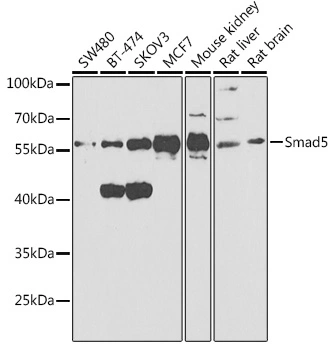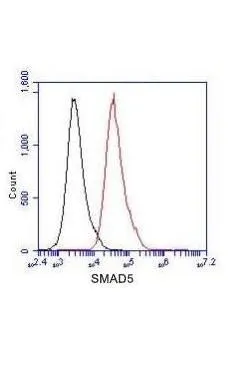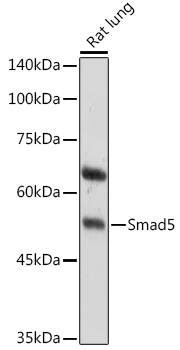![FACS analysis of Jurkat cells using GTX60384 SMAD5 antibody [3H9]. Green : SMAD5 Purple : negative control FACS analysis of Jurkat cells using GTX60384 SMAD5 antibody [3H9]. Green : SMAD5 Purple : negative control](https://www.genetex.com/upload/website/prouct_img/normal/GTX60384/GTX60384_20170912_FACS_w_23061123_569.webp)
FACS analysis of Jurkat cells using GTX60384 SMAD5 antibody [3H9]. Green : SMAD5 Purple : negative control
SMAD5 antibody [3H9]
GTX60384
ApplicationsFlow Cytometry, ImmunoFluorescence, Western Blot, ELISA, ImmunoCytoChemistry, ImmunoHistoChemistry, ImmunoHistoChemistry Paraffin
Product group Antibodies
TargetSMAD5
Overview
- SupplierGeneTex
- Product NameSMAD5 antibody [3H9]
- Delivery Days Customer9
- Application Supplier NoteWB: 1/500 - 1/2000. ICC/IF: 1/200 - 1/1000. IHC-P: 1/200 - 1/1000. FACS: 1/200 - 1/400. ELISA: 1/10000. *Optimal dilutions/concentrations should be determined by the researcher.Not tested in other applications.
- ApplicationsFlow Cytometry, ImmunoFluorescence, Western Blot, ELISA, ImmunoCytoChemistry, ImmunoHistoChemistry, ImmunoHistoChemistry Paraffin
- CertificationResearch Use Only
- ClonalityMonoclonal
- Clone ID3H9
- ConjugateUnconjugated
- Gene ID4090
- Target nameSMAD5
- Target descriptionSMAD family member 5
- Target synonymsDWFC, JV5-1, MADH5, mothers against decapentaplegic homolog 5, MAD, mothers against decapentaplegic homolog 5, SMA- and MAD-related protein 5, SMAD, mothers against DPP homolog 5, mothers against decapentaplegic, drosophila, homolog of, 5
- HostMouse
- IsotypeIgG1
- Protein IDQ99717
- Protein NameMothers against decapentaplegic homolog 5
- Scientific DescriptionThe protein encoded by this gene is involved in the transforming growth factor beta signaling pathway that results in an inhibition of the proliferation of hematopoietic progenitor cells. The encoded protein is activated by bone morphogenetic proteins type 1 receptor kinase, and may be involved in cancer. Alternative splicing results in multiple transcript variants. [provided by RefSeq, Feb 2014]
- Storage Instruction-20°C or -80°C,2°C to 8°C
- UNSPSC12352203

![ICC/IF analysis of NTERA-2 cells using GTX60384 SMAD5 antibody [3H9]. Green : SMAD5 Blue: DRAQ5 fluorescent DNA dye Red: Actin filaments ICC/IF analysis of NTERA-2 cells using GTX60384 SMAD5 antibody [3H9]. Green : SMAD5 Blue: DRAQ5 fluorescent DNA dye Red: Actin filaments](https://www.genetex.com/upload/website/prouct_img/normal/GTX60384/GTX60384_20170912_ICCIF_w_23061123_478.webp)
![IHC-P analysis of human brain tissue (left) and lung cancer tissue (right) using GTX60384 SMAD5 antibody [3H9]. IHC-P analysis of human brain tissue (left) and lung cancer tissue (right) using GTX60384 SMAD5 antibody [3H9].](https://www.genetex.com/upload/website/prouct_img/normal/GTX60384/GTX60384_20170912_IHC-P_w_23061123_591.webp)
![WB analysis of HeLa (1), SK-N-SH (2), PC-12 (3), Jurkat (4), and K562 (5) cell lysate using GTX60384 SMAD5 antibody [3H9]. WB analysis of HeLa (1), SK-N-SH (2), PC-12 (3), Jurkat (4), and K562 (5) cell lysate using GTX60384 SMAD5 antibody [3H9].](https://www.genetex.com/upload/website/prouct_img/normal/GTX60384/GTX60384_20170912_WB_w_23061123_676.webp)




